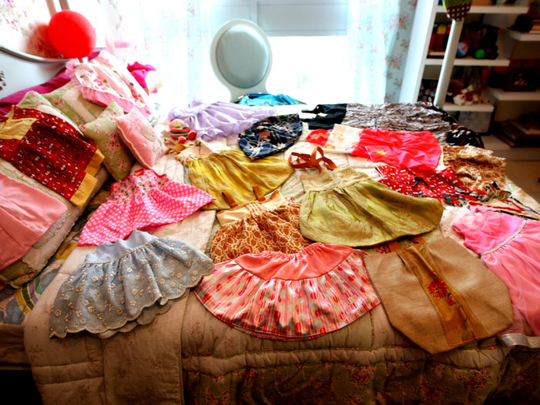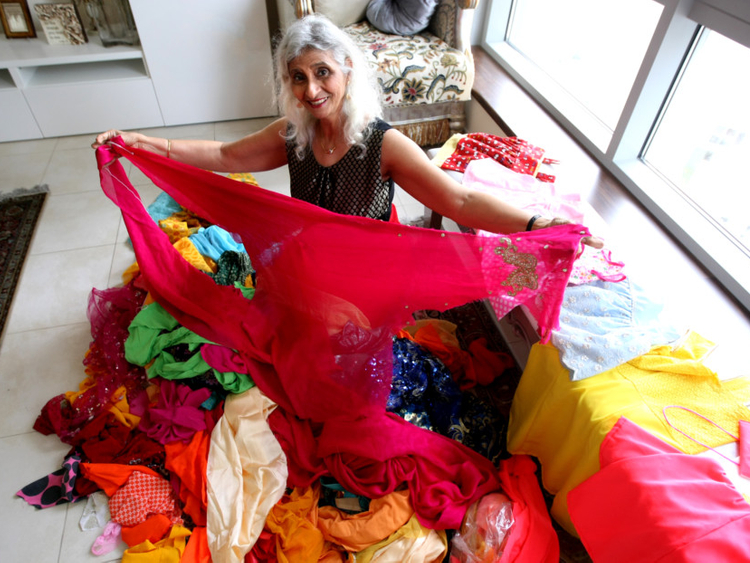
Dubai: A rack of steel shelves stacked one on top of the other, with more than six bags on each shelf stuffed with bits and pieces of clothing material greets you on the left hand side of the room adjacent to a wooden cabinet.
Swathes of material are found hanging from shelves, certificates are proudly displayed and pictures of loved ones adorn the room as a reminder of their support. Samples of toilet paper holders stitched to perfection are found hanging on the door from sparkling metal rings made as bathroom accessories.
Ahead, a ray of light coming through a small window falls on a sewing machine placed on a cloud-white wooden desk stacked with needles and thread. No, this is not some tailor shop, but Tasleem Karmali’s store room that also serves as her sewing haven.
Karmali, an educational psychologist from India, has had a passion for stitching since the age of 18. As a child, her family back in Mumbai owned a furniture shop where she watched sofas being made from scratch.
Once the sofa was complete with the necessary components in place and materials stitched with fine finishing, Karmali would collect the remaining bits of cloth to create her own creations. At the age of 18 she was able to make her first articles of clothing from the bits she collected.
“We used to live in one big family house back home and my aunt was responsible for stitching new clothes for us when we all lived together,” she explained. “When my aunt got married and moved away when I was around 18 years old, I decided to start learning and making clothes from scratch.”
Karmali’s continued her career in psychology working as a counsellor in schools, teaching psychology to students and aided those with special needs. However, her passion for sewing never dimmed.
“I wanted to open a small boutique to use my skills, but my husband told me that if profit isn’t made, we will be losing lots of money,” she said. “Plus buying the materials is expensive.”
The light bulb moment
“I was lying in bed with my eyes shut and that’s when an idea struck me,” said Karmali. “I thought if I can’t afford to open up a boutique, I can take leftover materials from tailors, make outfits to sell and donate the money to charity.”
Karmali then began her journey from one tailor to another, collecting piles of cut-up bits and pieces of fabric to turn into proper outfits. Once she returned home, she sat with her daughter and started the sifting process, grouping materials according to colour and texture.
“We divide the material, we clean it and sometimes even iron it because they’ve been crumpled in bags for weeks, so they need to be ironed before the sewing process begins,” Karmali clarified.
She also added that collecting the left over materials from the tailors is a win-win situation. By doing so, she got free cloth, which she then turned into intricately made outfits, and tailors saved money they would have paid to the municipality.
“The Baladeya [municipality] charges them Dh2,500 to dispose of the left over bits and pieces in the shops, so when I take them, I basically save them the money,” said Karmali.
Shows
Once the pieces are sorted, Karmali thinks about the pieces that can be stitched together to make a skirt, shirt or even a dress. According to her, two completely different pieces of cloth from different tailors and different material can be sewn together to make a beautifully vibrant dress.
“The pieces of cloth used in one item depends on what I will be making,” said Karmali. “Some dresses consist of 10 different pieces with some taking 3-4 days, since they are so intricate.”
Her mission is to allow her creative bent flow into her work so that she can raise money for charity. To help fulfil her mission, she has been invited to sell clothing at different events, host shows and even donate some of her items for the underprivileged.
Part of her mission is to reduce wastage of certain resources — in this case cloth — that could be used wisely and carefully to create something new. To spread awareness about her work and to encourage people to waste less and utilise more, she organises shows where she showcases her own creations.
“I wear the clothes made from rags and when my family members attend these shows, they too wear them as we walk the ramp to showcase outfits that were once rags and cut outs,” she beamed proudly.
“Walking the ramp” is the action of walking on a pre-built catwalk for people to proudly display their outfits made by. Karmali who offers participants useful tips to boost their confidence before walking the ramp, said: “We carried out a mother’s day fashion show for different age groups. The point was to encourage the women to feel good about themselves, to give them the sense of ‘I can’, by telling them to keep their backs straight, their chins up and carry their beautiful smiles as they walk through.”
Karmali was also invited by Indian politician and retired police officer Kiran Bedi to showcase her work in New Delhi. She made shirts, skirts, dresses and even undergarments which were donated to underprivileged children in India.
Donations
“After one of my shows, I donated the money to an area in Gujarat, India to pay for cataract operations of people,” she said.
She came to know about the high demand for cataract surgeries when her mother needed one and decided this was a nice way to pay back to society.
As a psychologist, Karmali visited Al Amal Hospital and decided to contribute to the patients’ improvement with a donation of a different sort.
“With the money I made from one of my shows, I decided to donate two sewing machines worth Dh2,500 each to the hospital for patients to engage in an activity that could improve their well-being and mood,” she said.
Karmali added that she will continue to sew as long as her ideas never run out and she will continue to raise money for good causes.
— Maria Botros is a trainee at Gulf News.













